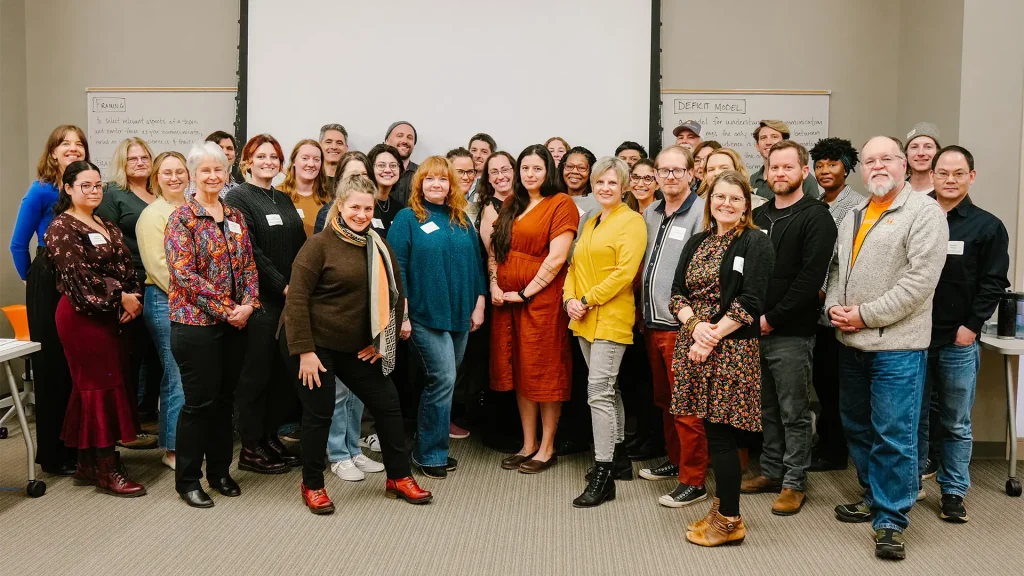“Yes, And” for Science

A group of UT Knoxville faculty and communications staff engaged in a unique workshop in January that found them applying elements of improvisational acting to science communications.
The Alan Alda Center for Communicating Science presented information-sharing approaches that further enhance the high standard of interdisciplinary collaboration and inquiry of the College of Arts and Sciences (CAS) and partners across the university. The highly interactive workshop was part of this year’s Scopes Centennial series of events, marking the 100th year since the landmark legal battle that brought opposing viewpoints of science education face-to-face.
In the spirit of communication and mutual understanding, the core lesson of the Alda course is in using the improvisational “yes, and” concept: hearing what one’s conversation partner is saying and offering a response that builds on the information shared. The result is getting past the “deficit model” of information sharing—one person sharing in one direction, such as in a class lecture—and forming a mutually involved conversation that increases understanding for both speakers.
“My job is to get people to be more open and available to their impulses,” said workshop facilitator Lydia Franco-Hodges. “To listen and to gain a fresh perspective on how to talk about their work with their audiences while plucking up the courage to do so. Connection is vital.”

In the process, participants get in touch with the “why” of talking about their work and maintain a caring attitude toward their audiences, or “communication partners,” as center namesake Alan Alda likes to say.
“One of the most valuable insights I got out of the workshop was the value of ‘yes, and,’” said Kat Jordan-Burmeister, a post-doctoral researcher in the Department of Earth, Environmental, and Planetary Sciences. “This phrase does not imply you agree with everything in a conversation, but it shows an effort to find common ground. It prevents a wall going up in a conversation. This workshop far exceeded my expectations. I came in open-minded and was not disappointed.”
The team from the Alda Center appreciated the eager Volunteer Spirit exhibited by the UT participants, which included faculty from multiple CAS departments, the Herbert College of Agriculture, the College of Communication and Information, the office of Teaching and Learning Innovation, and communicators from CAS and the UT Office of Communications and Marketing.
“What an excellent group,” said facilitator Nancee Moes. “Folks were warm, hospitable, and open from the start. I noticed an eagerness to share and connect, which always creates strong group cohesion.”
Several activities involved the entire group, while others found participants going one-on-one with colleagues from various disciplines to experience different aspects of story-sharing.
“I strive to have each participant try something new during the workshop,” said facilitator Elizabeth Bojsza. “A lot of growth and insight can happen when people are in that uncharted territory. They can gain a clearer perspective on their communication defaults, or generate creative strategies, for example.”

One exercise instructed them to follow each other’s statements with a “no, but” contradictory statement, then contrast by taking the “yes, and” approach.
“So many of the activities in this kind of training depend on showing up for each other,” said Moes. “It just doesn’t work if people don’t commit for both themselves and their partner. That never seemed to be a problem with the UT group. They were quick to encourage and support each other, and to help each other out when needed.”
Juan Luis Jurat-Fuentes, a professor in entomology and plant pathology, found a kinship in the use of the workshop’s improvised communication techniques and the techniques he uses teaching dance with the UT Tango Club.
“This is a powerful model as it provides ways to improve message delivery and establish a connection with your audience,” said Jurat-Fuentes. “I also found the exercises on incorporating detailed storytelling very helpful.”
Faculty members plan to take the workshop’s insights back to their daily work.
“Many of the activities reinforced the idea of active listening, which will be a critical skill for students entering the workforce in the future,” said Taylor Ruth, assistant professor in agricultural leadership, education, and communications. “I am excited to take what I learned from this workshop and share it with the next generation of science communicators.”